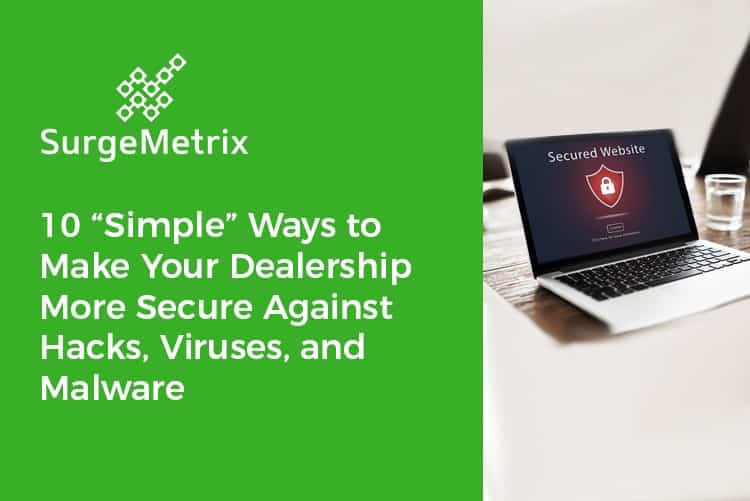For any business owner, keeping your dealership secure is vital. You need to do all you can to protect your records, marketing data, legal documents, and cash as well as your employees. You lock your doors and create security policies, but do you have the same vigilance with your digital doors and policies?
Your 10 Steps
Securing your digital devices and networks against hacks, viruses and malware will always be highly prioritized. Here are 10 ways of securing your computers and computer networks. Think of it as a checklist you can discuss with your IT consultant or staff member.
- Use a Firewall
Windows OS comes with its own firewall so at a minimum all you need to do is turn it on. Alternatively, you can purchase and install a third party firewall program. A firewall filters what gets into and what leaves your computer system. Remember to update the firewall often or if possible you can turn on auto-update. If you have a large dealership or group, make sure the firewall you use is sufficient for your needs. Check with your IT consultant or staff member. Tell them to prove to you that what you have works and meets your needs. - Install Anti-virus and Anti-malware Software, and Keep It Up-To-Date
New worms, viruses and other forms of malware are being created daily; you need to stop them right at the door. You can actually turn on auto-update so that they are always aware of and equipped to fight any new threats. - Update your Operating System Regularly
Mac OS and Windows OS both need to be updated often if they are to remain secure from hacks and malware attacks. Again you can turn on auto-update and make sure that your IT consultant or staff member can prove they has all your operating systems and software on an automatic update schedule. - Update Your Software Regularly
“Software” here refers to every program that is running on your system. A program such as Adobe, for example, appears on almost every computer and hackers know that. But Adobe is also dangerously vulnerable to attacks. It is therefore important to update such programs regularly. - Create an Email Policy and Never Open Suspicious Email… Even If It is From a Trusted Friend
If you don’t have an email policy for your staff, make one. Tell them that even if an email asks them for passwords and usernames, delete it. If it comes with an attachment or links to click, do NOT open the attachment or clicking the link unless you KNOW the source is valid. If it is a friend, check with them. If it is from a respected business, mouse over the link and check the source URL. If it is not from that URL, delete the message. - Completely Erase Hard Drives Before Throwing Them Away
Office copiers and data drives presumed to be dead are a goldmine for data thieves so before you throw that hard drive away, ensure that all data on it has been properly erased. Just deleting is not enough. Data destruction software is best and often free. Use this list to start… - Create a Social Media Policy
Social media and e-mails are often targeted by hackers. In fact most information is now leaving your premise via email, Twitter or Facebook. An effective policy assumes that nothing stays private on the internet; if you have content that must be kept private, it should never get onto the internet. Again, make sure you discuss this with IT to know how they are handling your needs. - Use Passwords and Ensure That They are Strong Enough
You cannot underestimate the significance of strong passwords in computer systems security. It is much more difficult to break into a computer that is locked with a strong password than one without a password. A strong password consists of letters, numbers and special characters. An easy trick for passwords is to write a 12 word sentence and pick the first or last letter of each word and then switch out numbers for letters and use punctuation. Voila! A great password. - Encrypt Wireless Networks
Wireless networks are of great convenience, but without encryption they are open to anyone within proximity – including hackers. Higher number encryptions (as you move closer to 152-bit) are stronger and therefore more secure because one would need a very long password to access the network. Find out what your IT consultant or staff member uses… - Back-up Your Data… and I Mean It!
Round off your efforts by backing up critical data on a regular basis. You never know what awaits you. It may be a hacker attack, a virus or a system crash that wipes your memory disks clean. You never want to be in the position where you have to say “I should have backed-up my data, but…”. Do it and do it often and make sure it is a policy across your business network.
Wrap Up
That’s it. While these solutions do not guarantee absolute security, they are a great start. Now work with your IT consultant or staff to find out what they have in place for you… Or, feel free to contact us or give us a call at 954.507.6454.
